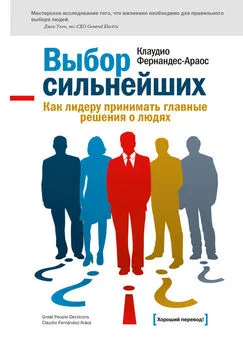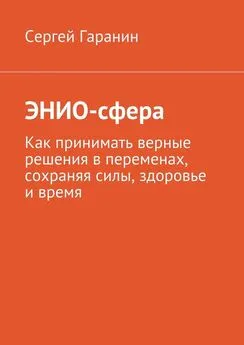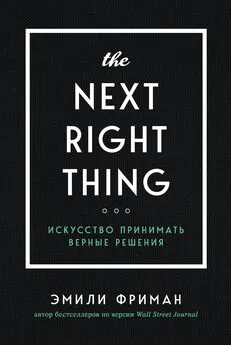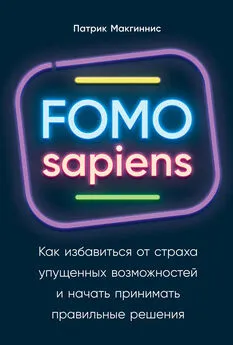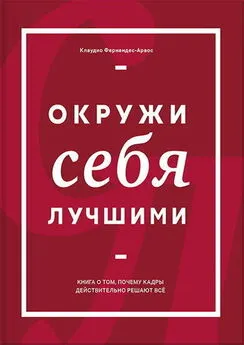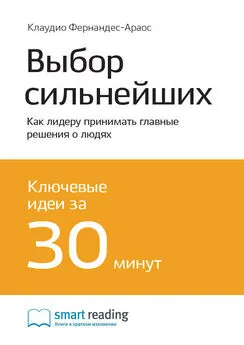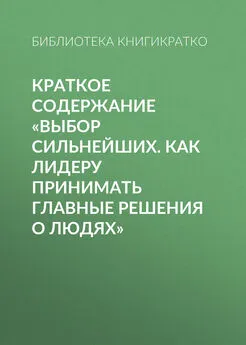Клаудио Фернандес-Араос - Выбор сильнейших. Как лидеру принимать главные решения о людях
- Название:Выбор сильнейших. Как лидеру принимать главные решения о людях
- Автор:
- Жанр:
- Издательство:Литагент МИФ без БК
- Год:2016
- Город:Москва
- ISBN:978-5-91657-438-8
- Рейтинг:
- Избранное:Добавить в избранное
-
Отзывы:
-
Ваша оценка:
Клаудио Фернандес-Араос - Выбор сильнейших. Как лидеру принимать главные решения о людях краткое содержание
Выбор сильнейших. Как лидеру принимать главные решения о людях - читать онлайн бесплатно ознакомительный отрывок
Интервал:
Закладка:
128
Cary Cherniss and Daniel Goleman, The Emotionally Intelligent Workplace: How to Select for, Measure, and Improve Emotional Intelligence in Individuals, Groups and Organizations (Jossey-Bass, 2001), pp. 182–206.
129
The CREIO web site ( http://www.eiconsortium.org/) Сайт приводит широкий список источников, которые подтверждают данную мысль, наряду с описанием подхода «Эмоциональные компетенции» и возможностью скачать несколько относящихся к теме докладов и работ.
130
Richard E. Boyatzis, Elizabeth D. Stubbs, and Scott N. Taylor, “Learning Cognitive and Emotional Intelligence Competencies through Graduate Management Education” (Case Western Reserve University, Academy of Management Learning and Education, 2002), vol. 1, no. 2, pp. 150–162.
131
Richard E. Boyatzis, “Competencies Can Be Developed, But Not in the Way We Thought,” HEC Journal, Capability volume 2(2), 1996.
132
Daniel Goleman, Richard Boyatzis, and Annie McKee, Primal Leadership: Realizing the Power of Emotional Intelligence (Harvard Business School Press, 2002), pp. 111–112.
133
David C. McClelland and David H. Burnham, “Power Is the Great Motivator,” Harvard Business Review, January 2003: 117–126.
134
См., например, Gretchen M. Spreizer, Morgan W. McCall, Jr., and Joan D. Mahoney, “Early Identification of International Executive Potential,” Journal of Applied Psychology 82(1), 1997: 6–29.
135
Jack Welch and Suzy Welch, Winning (HarperCollins, 2005), p. 83.
136
Интернет-издание корпоративного журнала THE FOCUS online ( http://www.ezifocus.com/content/thefocus/issue/article.php/article/54300471), vol. X/l, 2006. Авторская тема номера – Jim Collins: “Filling the Seats: How People Decisions Help Build a Great Company.”
137
Boris Groysberg, Ashish Nanda, and Nitin Nohria, “The Risky Business of Hiring Stars,” Harvard Business Review , May 2004: 92–100.
138
R. Meredith Belbin, Management Teams (Butterworth Heinemann, 1996), pp. 9–18.
139
Boris Groysberg, Jeffrey T. Polzer, and Hillary Anger Elfenbein, “Too Many Cooks Spoil the Broth: How Too Many High Status Individuals Decrease Group Effectiveness,” Harvard Business School Working Paper Series No. 06–002, 2005.
140
Boris Groysberg, Andrew N. McLean, and Nitin Nohria, “Are Leaders Portable?” Harvard Business Review, May 2006: 93–100.
141
Более детально я обсуждаю процесс подтверждения ключевых компетенций при проведении поиска в своей статье “Hiring Without Firing” in the July – August 1999 issue of Harvard Business Review, pp. 109–120.
142
История Кеплера описана у Gerd Gigerenzer and Peter M. Todd, Simple Heuristics That Make Us Smart (Oxford University Press, 2000). См. главу “From Pride and Prejudice to Persuasion,” p. 287.
143
Valerie I. Sessa, and Jodi J. Taylor, The Executive Selection: Strategies for Success (Center for Creative Leadership, Jossey-Bass/Wiley, 2000), p. 65.
144
“The War for Talent,” The McKinsey Quarterly 3, 1998: 47.
145
В этом нет нашего эгоистического интереса: наш гонорар не зависит от того, будет ли финально назначенный кандидат внешним или внутренним.
146
“The Performance Impact of New CEOs,” MIT Sloan Management Review, winter 2001, p. 14.
147
“The Performance Impact of New CEOs,” MIT Sloan Management Review, winter 2001, p. 14.
148
“Leadership and Change,” Knowledge Wharton, March 23 – April 5, 2006.
149
Эта история взята из выкладки в Википедию Роберта Айгера, к которой я обратился в августе 2006 г.
150
Valerie I. Sessa and Jodi J. Taylor, The Executive Selection: Strategies for Success (Center for Creative Leadership, Jossey-Bass, 2000), pp. 73–74.
151
Barry Jaruzelski, Ken Dehoff, and Rakesh Bordia, “Money Isn’t Everything,” Booz Allen Hamilton Inc, Resilience Report, 2005: 3.
152
Alexander Kandybin and Martin Kihn, “Raising Your Return on Innovation Investment,” Strategy + Business, May 11, 2004, 35.
153
Henry Chesbrough, Open Innovation: The New Imperative for Creating and Profiting from Technology (Harvard Business School Press, 2003).
154
Keld Laursen and Ammon Salter, “Open for Innovation: The Role of Openness in Explaining Innovation Performance among UK Manufacturing Firms,” Strategic Management Journal 27(2), 2006, 131–150.
155
John S. Hammond, Ralph L. Keeney, and Howard Raiffa, Smart Choices: A Practical Guide to Making Better Decisions (Harvard Business School Press, 1999), p. 47.
156
Rakesh Khurana, “Finding the Right CEO: Why Boards Often Make Poor Choices,” MIT Sloan Management Review, fall 2001.
157
Gerd Gigerenzer and Peter M. Todd, Simple Heuristics That Make Us Smart (Oxford University Press, 2000). См. главу “From Pride and Prejudice to Persuasion,” pp. 287–308.
158
Gerd Gigerenzer and Peter M. Todd, Simple Heuristics That Make Us Smart (Oxford University Press, 2000). См. главу “From Pride and Prejudice to Persuasion,” pp. 287–308.
159
Valerie I. Sessa, Robert Kaiser, Jodi J. Taylor, and Richard J. Campbell, “Executive Selection: A Research Report on What Works and What Doesn’t” (Center for Creative Leadership, 1998), p. 42.
160
Allen I. Kraut, “A Powerful and Simple Way to Predict Executive Success: Results from a 25-Year Study of Peer Evaluations,” представлено на форуме Общества индустриальной и организационной психологии Leading Edge Consortium, St. Louis, Missouri, October 28, 2005 ( http://www.siop.org/lec/kraut.htm).
161
Mark Granovetter, Getting a Job: A Study of Contacts and Careers (University of Chicago Press, 1995, 1974), pp. 11–16.
162
Говоря о традиционных источниках при поиске кандидатов, заинтересованные в сопоставлении их относительных преимуществ и недостатков могут обратиться к главе 2 книги Дайаны Артур Recruiting, Interviewing, Selecting and Orienting New Employees (American Management Association) – там приведен список основных качественных преимуществ и недостатков большого числа традиционных источников, в том числе рекламы.
163
Patricia Nakache, “Finding Talent on the Internet,” Harvard Business Review, April 1997.
164
Theodore Levitt, The Marketing Imagination (Free Press, 1986, 1983), p. 129.
165
Duncan J. Watts, Six Degrees: The Science of a Connected Age (W.W. Norton, 2003), pp. 37–39.
166
Duncan J. Watts, Six Degrees: The Science of a Connected Age (W.W. Norton, 2003), p. 95.
167
Rakesh Khurana, “Market Triads: A Theoretical and Empirical Analysis of Market Intermediation,” Journal for the Theory of Social Behavior 32(2), June 2002: p. 253.
168
Valerie I. Sessa, Robert Kaiser, Jodi J. Taylor, and Richard J. Campbell. “Executive Selection: A Research Report on What Works and What Doesn’t” (Center for Creative Leadership, 1998), p. 42.
169
Allen I. Huffcutt, Philip L. Roth, and Michael A. McDaniel, “A Meta-Analytic Investigation of Cognitive Ability in Employment Interview Evaluations: Moderating Characteristics and Implications for Incremental Validity,” Journal of Applied Psychology 81(5), 1996: 459–473.
170
James Tapper, “Is This Britain’s Most Brazen Conwoman?” The Mail on Sunday, November 27, 2005.
171
James B. Mintz, “Résumé Fraud Starts at the Top,” Across the Board, July – August 2006: 45–47.
172
T.W. Dougherty and D.B. Turban, “Behavioral Confirmation of Interviewer Expectations,” in The Employment Interview Handbook, edited by R.W. Eder and M.M. Harris (Thousand Oaks, CA: Sage, 1999).
173
Malcolm Gladwell, Blink: The Power of Thinking Without Thinking. (Little, Brown, January 2005), pp. 73–74.
174
Malcolm Gladwell, Blink: The Power of Thinking Without Thinking. (Little, Brown, January 2005), p. 64.
175
Daniel Goleman, Social Intelligence: The New Science of Human Relationships (Bantam Books, 2006), p. 67.
176
T.W. Dougherty, D.B. Turban, and J.C. Callender, “Confirming First Impressions in the Employment Interview: A Field Study of Interviewer Behavior,” Journal of Applied Psychology 79, 1994: 659–665.
177
David C. McClelland, “Identifying Competencies with Behavioral-Event Interviews,” Psychological Science 9(5), September 1998.
178
Richard E. Boyatzis, “Using Tipping Points of Emotional Intelligence and Cognitive Competencies to Predict Financial Performance of Leaders” (Case Western Reserve University, Psicothema 2006), vol. 18, suppl., pp. 124–131.
179
Frank L. Schmidt and John E. Hunter, “The Validity and Utility of Selection Methods in Personnel Psychology: Practical and Theoretical Implications of 85 Years of Research Findings,” Psychological Bulletin 124(2), 1998: 262–274.
180
Claudio Fernández-Aráoz, “Hiring Without Firing,” Harvard Business Review , July-August 1999: 109–120.
181
Allen I. Huffcutt and David J. Woehr, “Further Analysis of Employment Interview Validity: A Quantitative Evaluation of Interviewer-Related Structuring Methods,” Journal of Organizational Behavior 20(4), 1999: 549–560.
Читать дальшеИнтервал:
Закладка:
